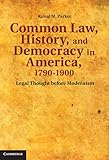Common law, history, and democracy in America, 1790-1900 : legal thought before modernism
Material type: TextSeries: Cambridge historical studies in American law and societyPublication details: New York : Cambridge University Press, 2011.Description: xi, 305 pISBN:
TextSeries: Cambridge historical studies in American law and societyPublication details: New York : Cambridge University Press, 2011.Description: xi, 305 pISBN: - 9780521519953 (hardback)
- 0521519950 (hardback)
- 340.141 PAR
| Item type | Current library | Call number | Status | Date due | Barcode |
|---|---|---|---|---|---|
|
|
IUCIPRS General Stacks | 340.141 PAR (Browse shelf(Opens below)) | Available | IPR0530 |
Machine generated contents note: 1. Introduction; 2. The creation of times: the common law and history: the British background; 3. Time as consent: common law thought after the American Revolution; 4. Time as spirit: common law thought in the early nineteenth century; 5. Time as law: common law thought in the mid nineteenth century; 6. Time as life: common law thought in the late nineteenth century; 7. Conclusion.
"This book argues for a change in our understanding of the relationships among law, politics, and history. Since the turn of the nineteenth century, a certain anti-foundational conception of history has served to undermine law's foundations, such that we tend to think of law as nothing other than a species of politics. Thus viewed, the activity of unelected, common law judges appears to be an encroachment on the space of democracy. However, Kunal M. Parker shows that the world of the nineteenth century looked rather different. Democracy was itself constrained by a sense that history possessed a logic, meaning, and direction that democracy could not contravene. In such a world, far from law being seen in opposition to democracy, it was possible to argue that law - specifically, the common law - did a better job than democracy of guiding America along history's path"--Provided by publisher.
"This book argues for a change in our understanding of the relationships among law, politics and history. Since the turn of the nineteenth century, a certain anti-foundational conception of history has served to undermine law's foundations, such that we tend to think of law as nothing other than a species of politics. Thus viewed, the activity of unelected, common law judges appears to be an encroachment on the space of democracy. However, Kunal M. Parker shows that the world of the nineteenth century looked rather different. Democracy was itself constrained by a sense that history possessed a logic, meaning and direction that democracy could not contravene. In such a world, far from law being seen in opposition to democracy, it was possible to argue that law - specifically, the common law - did a better job than democracy of guiding America along history's path"--Provided by publisher.


There are no comments on this title.